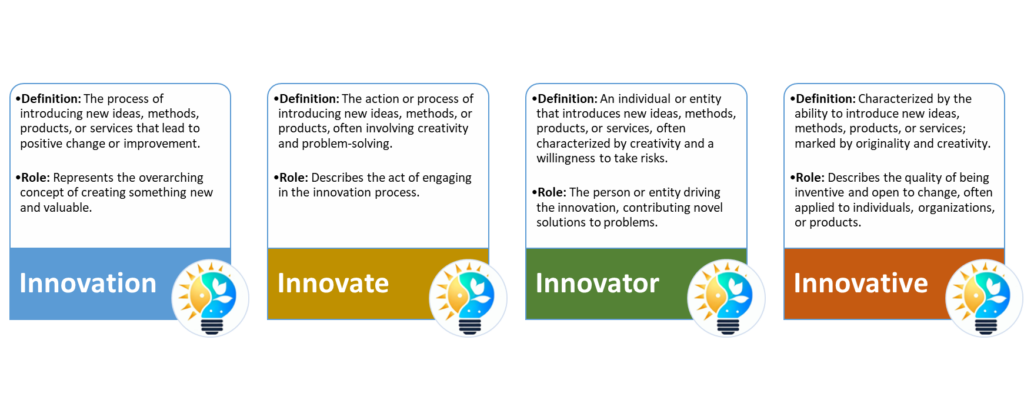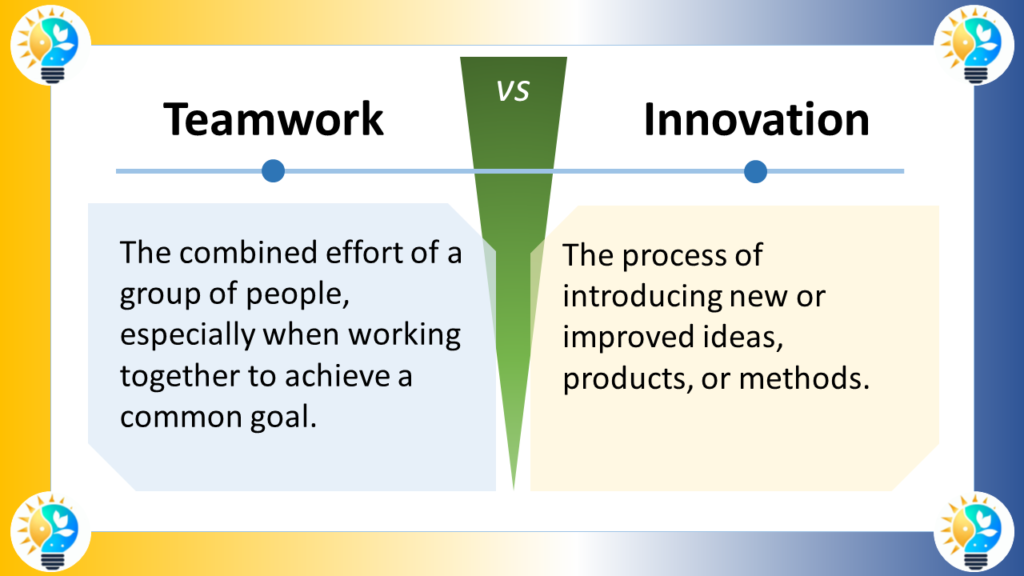When discussing innovation, it helps to understand the nuances between Innovation, Innovator, Innovate and Innovative.
Innovation, innovators, innovate, and innovative are closely related terms that all revolve around the concept of creating something new or making significant improvements.
Definition

Innovation
Innovation refers to the process of introducing new ideas, methods, or products that create value or improve existing solutions.
Characteristics of innovation:
• Introduces novelty or significant improvement
• Solves problems or addresses needs
• Creates value for users or stakeholders
• Often involves creativity and original thinking
• Can be incremental or disruptive
What is the Etymology of Innovation? Best Terms with Definitions.
Innovator
An innovator is a person who introduces new ideas, methods, or products, often challenging the status quo.
Characteristics of innovators:
• Creative thinkers
• Risk-takers
• Problem-solvers
• Visionaries
• Often possess strong leadership qualities
All the words about Innovators. How to best describe them?
Innovate
Innovate is the verb form, meaning to introduce new ideas, methods, or products or to make changes to existing ones.
Characteristics of innovating:
• Active process of creating or improving
• Involves experimentation and iteration
• Requires adaptation and learning
• Often collaborative in nature
• Can be applied to various fields and industries
Innovative
Innovative is an adjective describing something that introduces new ideas or methods, or is characterized by innovation.
Characteristics of innovative solutions:
• Novel or significantly improved
• Effective in addressing problems or needs
• Often more efficient than existing solutions
• May challenge conventional thinking
• Adaptable to changing circumstances
Synonyms for Innovative Technology: Cutting-Edge Vocabulary

Innovation is considered as a driving force in progress.
It includes the introduction of novel ideas, methods, or products that bring positive change and advancement.
For more information about innovations, check our glossary
Relationship and Relevance
These terms are closely interconnected, forming a cycle of progress and advancement.
Innovation is the overarching concept, while innovators are the driving force behind it.
To innovate is the action taken by innovators, and innovative solutions are the result of this process.
Understanding these nuances helps organizations foster a culture of continuous improvement and creativity.
To understand the nuances between Innovation, Innovator, Innovate, and Innovative, it’s helpful to break down each term:
Innovation refers to the process of introducing new ideas, methods, products, or services[1]. It’s the overall concept of creating something novel or improving upon existing solutions. Innovation is not just about inventing new products, but also about implementing new ideas across various aspects of business and society[3].
Innovator is a person who introduces new methods, ideas, or products[1]. An innovator is someone who actively engages in the innovation process, often by recognizing opportunities, combining existing resources in new ways, or bringing inventions to market[3].
Innovate is the verb form, meaning to make changes in something established, especially by introducing new methods, ideas, or products[1]. It’s the action of creating or implementing innovations.
Innovative is an adjective describing something (or someone) featuring new methods or characterized by innovation[1]. It refers to the quality of being novel, creative, or forward-thinking.
The key distinctions between these terms are:
- Process vs. Person: Innovation is the process, while an innovator is the person who drives that process.
- Action vs. Quality: To innovate is the action of creating something new, while innovative describes the quality of being new or creative.
- Scope: Innovation can encompass a wide range of activities, from small improvements to radical changes, while being innovative often implies a more significant departure from the norm.
- Application: Innovation is often used in a broader context (e.g., business strategy, technological advancements), while innovative can be applied to specific products, ideas, or approaches.
It’s important to note that these terms are interconnected. Innovators innovate to create innovations, and the process of innovation leads to innovative outcomes. Understanding these nuances can help in more precisely communicating about creativity, progress, and change in various contexts[5].
Context for Usage
• Innovation is often used in business, technology, and research contexts to describe the overall process of advancement.
• Innovator is typically applied to individuals or companies known for their groundbreaking ideas or products.
• Innovate is commonly used in strategic planning and goal-setting to emphasize the need for progress and improvement.
• Innovative is frequently used to describe products, services, or approaches that stand out for their novelty and effectiveness.
Examples
- Innovation: The development of smartphones revolutionized communication and computing.
- Innovator: Elon Musk is widely regarded as an innovator in electric vehicles and space technology.
- Innovate: Companies must continually innovate to stay competitive in the global market.
- Innovative: The use of blockchain technology in supply chain management is an innovative approach to improving transparency and efficiency.
FAQ
Q: Can anyone be an innovator?
A: While some people may have natural tendencies towards innovation, anyone can develop innovative thinking skills through practice and cultivation of creativity.
Q: Is innovation always about creating something entirely new?
A: No, innovation can also involve significant improvements to existing products, processes, or ideas.
Q: How can organizations foster innovation?
A: Organizations can encourage innovation by promoting a culture of creativity, providing resources for experimentation, and rewarding innovative thinking.
Q: Are all innovative ideas successful?
A: Not necessarily. Many innovative ideas fail, but failure is often an important part of the innovation process, leading to learning and improvement.


